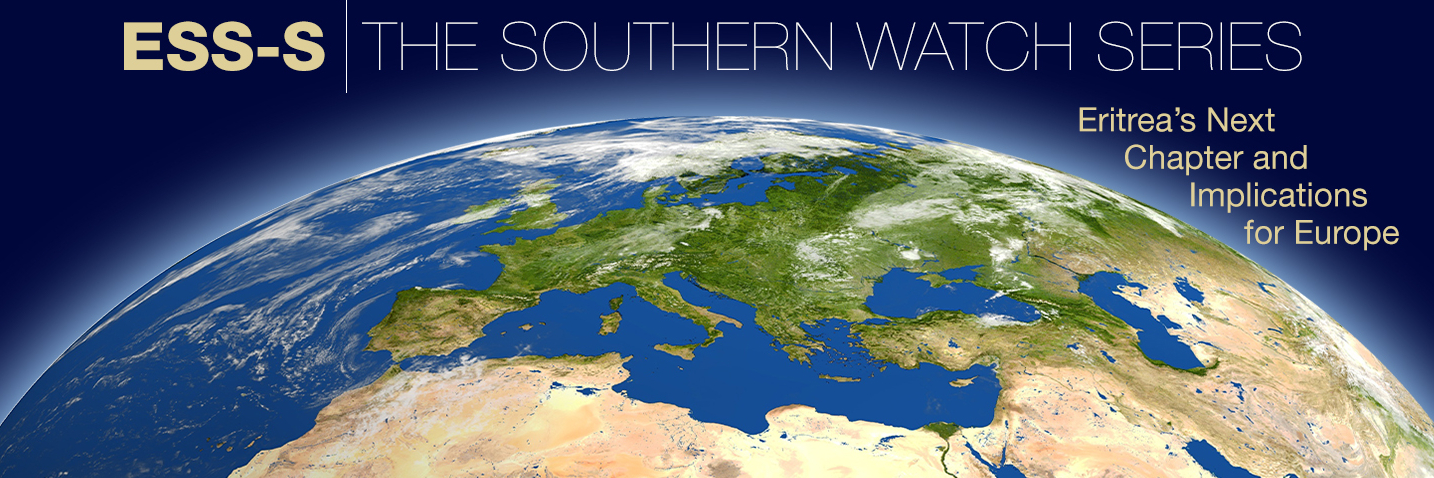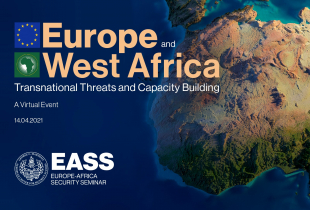
Eritrea’s Next Chapter
Introduction
Participants from Europe, Africa, the Middle East, and the United States gathered online to discuss Eritrea as part of the Southern Watch Series (SWS) in April 2022. The SWS is an ongoing series of virtual conversations surveying current and emerging security challenges in Africa and the Middle East, and their implications for Europe and the United States. It is an initiative of the Marshall Center’s European Security Seminar – South. The conversation featured remarks from Dr. Nicole Hirt of the German Institute for Global and Area Studies and Dr. Harry Verhoeven of Columbia University, and this article benefited from notes taken by Mr. Jelle Freriks. These highlights reflect non-attribution takeaways that emerged from group discussion and do not represent the views or positions of any individual panelist or participant.
Eritrea’s President Will Cling to Power until the Bitter End.
The 76-year-old president of Eritrea, Isaias Afwerki, may still be in office at the time of his death. Isaias has been a fighter literally since he was a teenager: he ran the liberation movement and has ruled Eritrea for decades, the country’s sole leader since independence in 1993. He will fight to retain power until his last breath. Mechanisms for his removal, moreover, are lacking. The country has no history of holding elections. Military figures, potential ‘liberators from the liberator,’ have been cowed through repression and purges, leaving only obedient, elderly generals atop a precarious technical hierarchy. The Eritrean diaspora in the West and the Gulf, meanwhile, is weak and fragmented, and in fact it includes strong pro-regime components. Eritrea has no experience with political transition, and Isaias retains a tight grasp on the reins of power. He has installed himself as an absolute dictator, wielding a subjugated military and submissive secret service over all other institutions, even dismantling his own party.
The Ordinary Eritrean’s Mindset May Match the Current President’s.
The average Eritrean probably shares much of Isaias’s worldview. It is true that perspectives among Eritreans might differ somewhat along ethnic and especially generational lines; thanks to connections with the diaspora, young Eritreans are more informed about world affairs than, say, North Koreans. Nonetheless, everyone in the country experiences certain lived realities that reinforce a regime-aligned outlook. Most significantly, Eritreans share national service. Isaias has instituted universal conscription for an indefinite period. This policy, by which the government mobilizes and regiments all new adults, provides the regime with free manual labor and helps to prevent social unrest. It has also been an important vector of indoctrination. Eritrea’s national service inculcates a defensive attitude that glorifies territorial integrity and national sovereignty, earned through lives sacrificed during the liberation struggle; and that vilifies the outside world as a source of threat and danger to the homeland. This view may resonate widely with an embattled population living in extremely difficult conditions. And life in Eritrea has only worsened with the coronavirus pandemic. Official COVID-19 cases have been rare and isolated to the capital, Asmara, but economic production and supplies to markets have stagnated across the board. Instead of inaugurating a vaccination campaign, the government has taken the opportunity to impose a harsh shutdown on schools and public transport. The full scope and scale of what must be a considerable human cost from disease and hunger may never be known.
Authoritarianism, Not Democracy, Will Likely Shape Eritrea’s Coming Politics.
Generations have grown up in Isaias’s Eritrea, and his influence will persist long after his own demise. Despite what Western authorities may hear from certain vocal sectors of the diaspora, democratization is improbable inside the country in the near term. Liberal ideas and values have had essentially no room to take root or grow during decades of highly centralized totalitarian rule. A substantial part of the diaspora, moreover, lives in Gulf countries, which have not been a training ground or incubator of democracy. Distrust of the West will probably persist, due to Isaias’s powerful anti-Western rhetoric and the checkered record of Western attempts to export democracy abroad. The post-Isaias Eritrea will undoubtedly face myriad economic and social troubles, and it is doubtful that people experiencing a rough transition will have time or space to engage newfangled foreign ideas about democracy.
Invasions by Regional Powers May Cause or Follow Regime Collapse.
Isaias benefits from regional and geopolitical disorder. He uses it to weaken neighbors that could threaten Eritrea and to strengthen his grip on the domestic scene. Eritrea’s role in the Tigray conflict is emblematic. Through this war, Asmara managed to downgrade a potential threat from Tigray province, weaken Ethiopia by contributing to its internal discord, extract partial revenge for the humiliation of the Badme War, and project Eritrean power and prestige abroad and at home. Isaias’s approach to foreign policy has been pragmatic and driven by interest. The ceasefire is transactional rather than based on principle, and Eritrea is sure to balance its new links to Ethiopia with growing ties to Gulf states. The country’s strategic position matters not only to regional middle powers but also to global powers. Isaias’s hatred of the ‘hypocritical’ United States means that Eritrea’s relations with the West are adversarial, whereas Asmara has teamed with Beijing and especially Moscow when an opportunity arises. Yet toying with instability also poses a risk to Eritrea, which may lose out as the rules-based international order is tested. Landlocked Ethiopia, in search of port access, could revive historic and geographic claims to Eritrea and find a reason to intervene. Invasion by one neighbor could provoke invasions by others, with several states professing a protective role over a specific Eritrean community based on ethnicity or religion, possibly reigniting traditional divisions between Eritrea’s Christian highlands and its Muslim lowlands along the coast. Regional actors could attack out of a simple desire to seize territory. Invasions may also come in response to chaos unleashed upon Isaias’s death, as neighboring states act to stop spillover, stemming refugee flows or staunching cross-border raids by violent non-state actors taking refuge in Eritrea. Interventions might even come while the aging Isaias is still alive. A neighboring nation could conceivably launch a so-called preventive war against Eritrea, if it fears its interests will be harmed in the most likely post-Isaias scenario. Meanwhile, any invasion would presumably reinforce the insular mindset of the Eritrean public, galvanizing the national ethos of defending and liberating territory from any and all foreign forces. The dynamic could ultimately make Eritrea, a militarized country filled with universal conscripts, virtually ungovernable by any external or even internal authority.
GCMC, Garmisch-Partenkirchen, April 20, 2022
About the Author
Dr. Benjamin P. Nickels is Professor of International Security Studies and Director of the European Security Seminar – South (ESS-S) at the George C. Marshall European Center for Security Studies. He leads the Marshall Center’s resident, outreach, virtual, and partnership programming on European and U.S. relations with North Africa, Sub-Saharan Africa, and the Middle East.
The George C. Marshall European Center for Security Studies
The George C. Marshall European Center for Security Studies in Garmisch-Partenkirchen, Germany is a German-American partnership and trusted global network promoting common values and advancing collaborative geostrategic solutions. The Marshall Center’s mission to educate, engage, and empower security partners to collectively affect regional, transnational, and global challenges is achieved through programs designed to promote peaceful, whole of government approaches to address today’s most pressing security challenges. Since its creation in 1993, the Marshall Center’s alumni network has grown to include over 16,000 professionals from 160 countries. More information on the Marshall Center can be found online at www.marshallcenter.org.
The Clock Tower Security Series provides short summaries of Seminar Series hosted by the George C. Marshall European Center for Security Studies. These summaries capture key analytical points from the events and serve as a useful tool for policy makers, practitioners, and academics.
The articles in the The Clock Tower Security Series reflect the views of the authors and are not necessarily the official policy of the United States, Germany, or any other governments.
